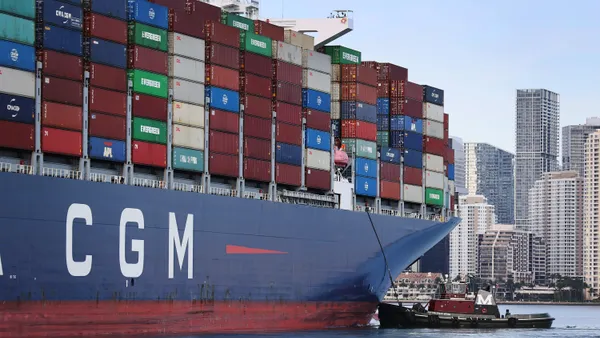Dive Brief:
- Lululemon is increasing its use of air freight "in order to avoid anticipated port congestion in the Asia region due to the pending tariff increases," CFO PJ Guido said on the company's first-quarter earnings call Wednesday.
- Guido expects the company will take a minor hit to its margins for the rest of the year as a result (20-25 basis points), with the majority of impact coming in the third quarter.
- "We're anticipating port congestion right around the timeframe starting in that mid to late July timeframe and we think it's prudent and important to deliver new product for our guests and protect the sales associated with those goods," Guido said on the call.
Dive Insight:
Guido made clear to analysts that the move toward air freight was to ensure on-time delivery of fall merchandise and not an attempt to beat tariffs. The CFO described the impact of the tariffs themselves on Lululemon as "moderate." Just 6% of the activewear company's finished goods come from China and just 1% are subject to tranche three tariffs. It's tranche four that could gum up the works for Lululemon's fall sales.
"We are protecting our fall deliveries," Guido said. "And that's why we're doing it, it's a hedge. So we're eliminating the risk."
Just as the move toward air freight is not primarily about Lululemon's actual tariff exposure, the congestion at Asia ports is not completely about other shippers rushing to get product out of China. It also stems from how ocean carriers are handling these routes.
"We've seen this before due to tariffs companies trying to get out ahead of it, but there is also a broader issue with carriers consolidating cargo," Guido said.
Ocean carriers operating transpacific routes are more frequently using larger ships, deemed ultra-large container vessels (ULCVs), according to The Loadstar. Larger ships are more cost-effective for carriers when full, but their proliferation is stoking concern from shippers and insurers who see an uptick in lost and mismanaged cargo. Larger ships lead to less overall service and can create port congestion as the 18,000-22,000 TEU vessels take longer to load.
This trend combined with an anticipated rush to get product out of China in July is a strong enough cocktail for Lululemon to seek an alternative freight mode going into the crucial peak season — even if it's a more expensive one.














